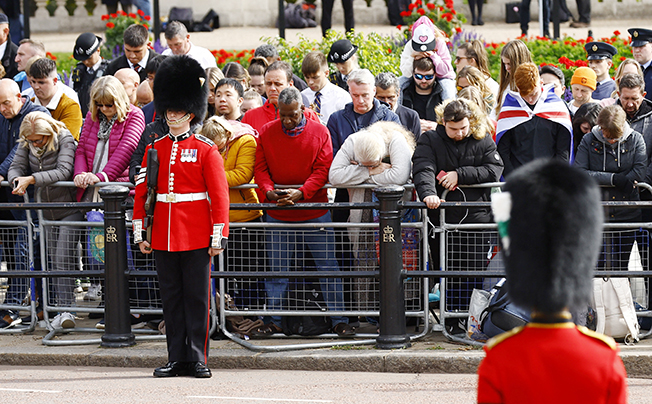The tens of thousands gathered in central London for the funeral of Queen Elizabeth fell silent and bowed their heads on Monday to follow her funeral service in Westminster Abbey and watch the procession of her coffin afterwards through the city.
Some watching in Hyde Park dabbed their eyes and others sobbed during the service, while later children were hoisted in the air or put on parents’ shoulders to see her coffin pass.
There was also applause among the crowd for a grand state funeral of pageantry and rousing music that captured how many felt for the queen, who died on Sept. 8 aged 96. She had been on the throne for 70 years, meaning most Britons have known no other monarch.
“I find it hard to express in words what we just witnessed. This was really special and memorable,” said Camilla Moore, 53, from Nottingham. “It was terribly sad. So very, very sad. The end of an era.”
Crowds followed the funeral service on large television screens or from a radio broadcast on loudspeakers.
Colin Sanders, 61, a retired soldier who had come to London from North Yorkshire to bid farewell to the queen, struggled to hold back tears listening on the Mall to the ceremony.
“It felt like we were there and part of it… it was very moving,” he said.
“I knew I’d well up … She’s like your grandma, a loving and caring person. She said she’d serve the country and that’s what she did.”
After the service in Westminster Abbey the queen’s coffin was being borne on a gun carriage through central London, past her Buckingham Palace home to the Wellington Arch at Hyde Park Corner. From there, it was to be placed on a hearse to be driven to Windsor Castle, west of London, for a service at St. George’s Chapel.
The crowds of young and old had come from around Britain and beyond, many camping out overnight to secure a good spot for watching the country’s first state funeral since 1965, when World War Two leader Winston Churchill was afforded the honour.
People climbed lampposts and stood on barriers and ladders to catch a glimpse of the royal procession.
“We wanted to come and see this historic event, to be part of it and to pay our respects to the queen and thank her for her long life of service,” said Alison Cornish, 66, from Ashford in Kent.
FILLING LONDON
More than an hour before the funeral service began all viewing areas in central London were declared full. Authorities had said they expected up to a million people might travel to the capital to follow the funeral.
Ben Vega, 47, a nurse from the Philippines, stood on a stool he had brought from home in west London.
“It’s a sad day for me. I’ve been here 20 years. I saw the queen as my second mum, England as my second home,” he said.
Melanie Odey, 60, a teacher, had camped out in a tent with her two daughters and grandchildren after arriving on Sunday afternoon.
“This is a once-in-a-lifetime opportunity to be part of history, to pay your respects,” she said. The queen “cared so much about this country”.
Some in the crowds were silent and sombre, dressed in black. Others wore bright colours and said they wanted to celebrate the queen’s life.
Shelly Chugg and Anita Evans, colleagues at Cardiff Council, left Wales at 1:00 a.m. to travel to London.
“I wouldn’t have missed this,” said Chugg, 51, who recalled seeing the queen as a child in 1977 during the silver jubilee celebrations of Elizabeth’s 25 years on the throne.
“I was going to wear black, but it’s a celebration of the queen’s life too, isn’t it? She liked to stand out in the crowd,” added Evans, 50, clad in white and green.
Anna Kathryn from Richmond, in southwest London, had never met or seen the queen. Yet she said her family felt they had a personal tie with her.
“It is like we have had a death in the family, we couldn’t miss this,” she said. “She was such a bright spot in everyone’s lives and now it feels like that light has gone out.”
Katie Williams, a 43-year-old nurse, arrived in London on Sunday. Clutching flowers in one hand and with tissues up her sleeve, she called the queen the “granny to the nation”.
“She was a sort of magnet drawing people from all over the country. We all loved her, we all respected her.”
Towns and cities all over Britain were broadcasting the state funeral and the rest of the day’s events on big screens.

